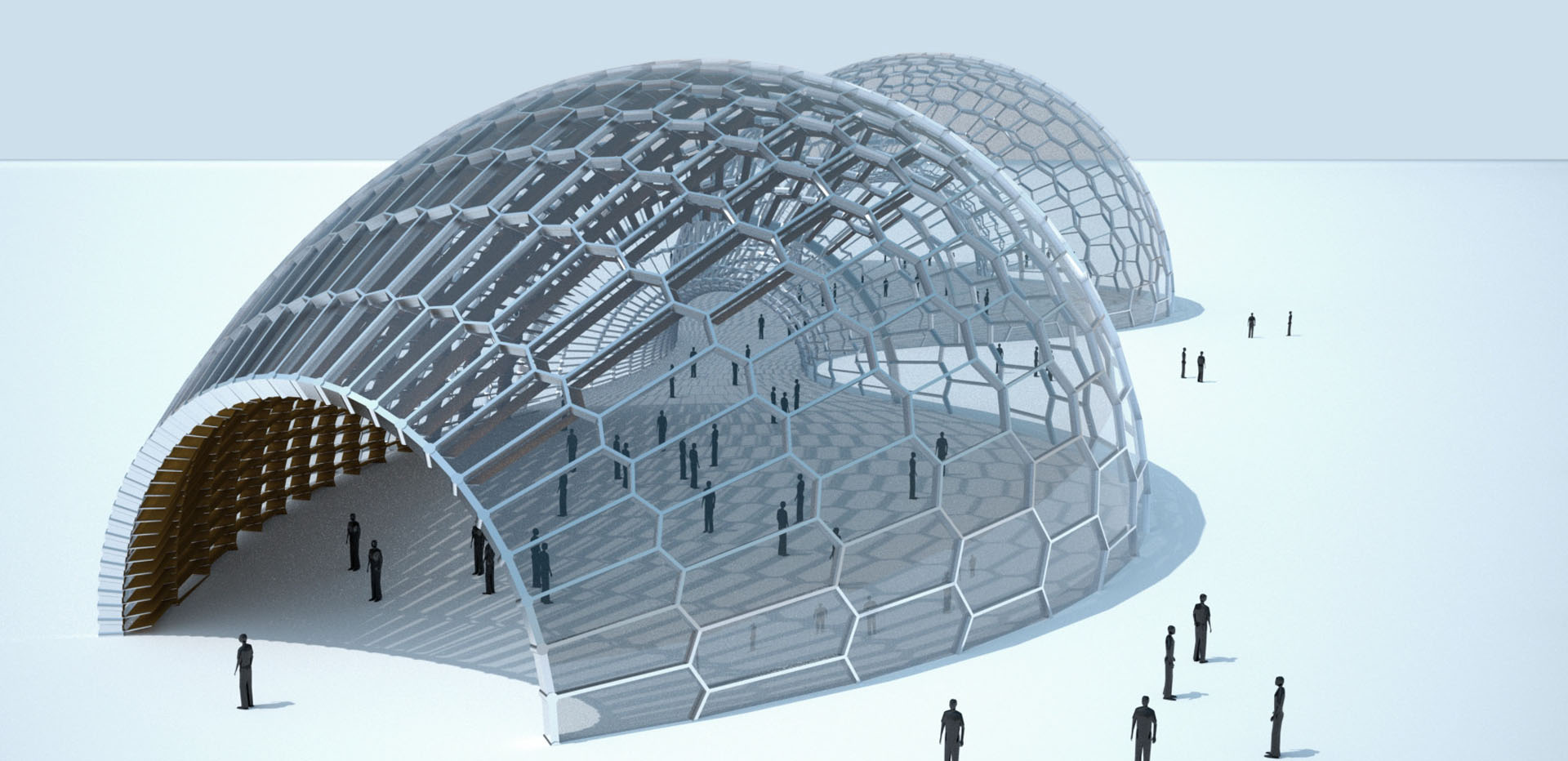“Geometry of multi-layer freeform structures for architecture” by Pottmann, Liu, Wallner, Bobenko and Wang
Conference:
Type(s):
Title:
- Geometry of multi-layer freeform structures for architecture
Presenter(s)/Author(s):
Abstract:
The geometric challenges in the architectural design of freeform shapes come mainly from the physical realization of beams and nodes. We approach them via the concept of parallel meshes, and present methods of computation and optimization. We discuss planar faces, beams of controlled height, node geometry, and multilayer constructions. Beams of constant height are achieved with the new type of edge offset meshes. Mesh parallelism is also the main ingredient in a novel discrete theory of curvatures. These methods are applied to the construction of quadrilateral, pentagonal and hexagonal meshes, discrete minimal surfaces, discrete constant mean curvature surfaces, and their geometric transforms. We show how to design geometrically optimal shapes, and how to find a meaningful meshing and beam layout for existing shapes.
References:
1. Akleman, E., Srinivasan, V., and Mandal, E. 2005. Remeshing schemes for semi-regular tilings. In Shape Modeling and Applications, Proceedings. IEEE, 44–50. Google ScholarDigital Library
2. Alliez, P., Cohen-Steiner, D., Devillers, O., Levy, B., and Desbrun, M. 2003. Anisotropic polygonal remeshing. ACM Trans. Graphics 22, 3, 485–493. Google ScholarDigital Library
3. Blaschke, W. 1929. Vorlesungen über Differentialgeometrie, vol. 3. Springer.Google Scholar
4. Bobenko, A., and Pinkall, U. 1996. Discrete isothermic surfaces. J. Reine Angew. Math. 475, 187–208.Google Scholar
5. Bobenko, A., and Springborn, B. 2004. Variational principles for circle patterns and Koebe’s theorem. Trans. Amer. Math. Soc. 356, 659–689.Google ScholarCross Ref
6. Bobenko, A., and Suris, Yu., 2005. Discrete differential geometry. Consistency as integrability. Monograph pre-published at http://www.arxiv.org/math/0504358.Google Scholar
7. Bobenko, A., and Suris, Yu. 2007. On organizing principles of discrete differential geometry, geometry of spheres. Russian Math. Surveys 62, 1, 1–43.Google ScholarCross Ref
8. Bobenko, A., Hoffmann, T., and Springborn, B. 2006. Minimal surfaces from circle patterns: Geometry from combinatorics. Ann. of Math. 164, 231–264.Google ScholarCross Ref
9. Brell-Cokcan, S., and Pottmann, H., 2006. Tragstruktur für Freiformflächen in Bauwerken. Patent No. A1049/2006.Google Scholar
10. Cecil, T. 1992. Lie Sphere Geometry. Springer.Google Scholar
11. Cohen-Steiner, D., Alliez, P., and Desbrun, M. 2004. Variational shape approximation. ACM Trans. Graphics 23, 3, 905–914. Google ScholarDigital Library
12. Cutler, B., and Whiting, E. 2007. Constrained planar remeshing for architecture. In Proc. Graphics Interface. Google ScholarDigital Library
13. Glymph, J., Shelden, D., Ceccato, C., Mussel, J., and Schober, H. 2002. A parametric strategy for freeform glass structures using quadrilateral planar facets. In Acadia 2002, ACM, 303–321.Google Scholar
14. Grosse-Brauckmann, K., and Polthier, K. 1997. Constant mean curvature surfaces derived from Delaunay’s and Wente’s examples. In Visualization and mathematics. Springer, 119–134. Google ScholarDigital Library
15. Hoffmann, T. 1998. Discrete rotational CMC surfaces and the elliptic billiard. In Mathematical Visualization, H. C. Hege and K. Polthier, Eds. Springer, 117–124.Google Scholar
16. Kelley, C. T. 1999. Iterative Methods for Optimization. SIAM.Google Scholar
17. Liu, Y., Pottmann, H., Wallner, J., Yang, Y.-L., and Wang, W. 2006. Geometric modeling with conical meshes and developable surfaces. ACM Trans. Graphics 25, 3, 681–689. Google ScholarDigital Library
18. Maekawa, T. 1999. An overview of offset curves and surfaces. Computer-Aided Design 31, 251–267.Google ScholarCross Ref
19. Nishikawa, Y., et al. 1998. Measurements of interfacial curvatures of bicontinuous structure from three-dimensional digital images. 1. A parallel surface method. Langmuir 14, 1241–1249.Google ScholarCross Ref
20. Oswald, P., and Schröder, P. 2003. Composite primal/dual √3-subdivision schemes. Comp. Aid. Geom. Des. 20, 135–164. Google ScholarDigital Library
21. Polthier, K. 2002. Polyhedral surfaces of constant mean curvature. Habilitationsschrift TU Berlin.Google Scholar
22. Polthier, K. 2002. Unstable periodic discrete minimal surfaces. In Nonlinear Partial Differential Equations. Springer, 127–143.Google Scholar
23. Pottmann, H., and Wallner, J. 2007. The focal geometry of circular and conical meshes. Adv. Comput. Math. to appear.Google Scholar
24. Pottmann, H., Brell-Cokcan, S., and Wallner, J. 2007. Discrete surfaces for architectural design. In Curves and Surfaces: Avignon 2006, P. Chenin et al., Eds. Nashboro Press.Google Scholar
25. Sauer, R. 1970. Differenzengeometrie. Springer.Google Scholar
26. Schief, W. K. 2006. On a maximum principle for minimal surfaces and their integrable discrete counterparts. J. Geom. Physics 56, 1484–1495.Google ScholarCross Ref
27. Schmitt, N., 2003. Noid. Java Applet, http://www-sfb288.math.tu-berlin.de/~nick/Noid/NoidApplet.html.Google Scholar
28. Schmitt, N., 2004. Constant mean curvature trinoids. preprint, http://www.arxiv.org/math/0403036.Google Scholar
29. Schneider, R. 1993. Convex bodies: the Brunn-Minkowski theory. Cambridge University Press.Google Scholar
30. Schober, H. 2003. Freeform glass structures. In Glass Processing Days 2003. Glass Processing Days, Tampere (Fin.), 46–50.Google Scholar
31. Schramm, O. 1997. Circle patterns with the combinatorics of the square grid. Duke Math. J. 86, 347–389.Google ScholarCross Ref
32. Sechelmann, S., 2006. Koebe polyhedron editor. Java Applet, http://www.math.tu-berlin.de/geometrie/ps/software.shtml.Google Scholar
33. SG. The smart geometry group. http://www.smartgeometry.com.Google Scholar
34. Sullivan, J. 2005. The aesthetic value of optimal geometry. In The Visual Mind II, M. Emmer, Ed. MIT Press, 547–563.Google Scholar
35. Tong, Y., Alliez, P., Cohen-Steiner, D., and Desbrun, M. 2006. Designing quadrangulations with discrete harmonic forms. In Symp. Geometry Processing. 201–210. Google ScholarDigital Library
36. Ziegler, G. 1995. Lectures on Polytopes. Springer.Google Scholar




